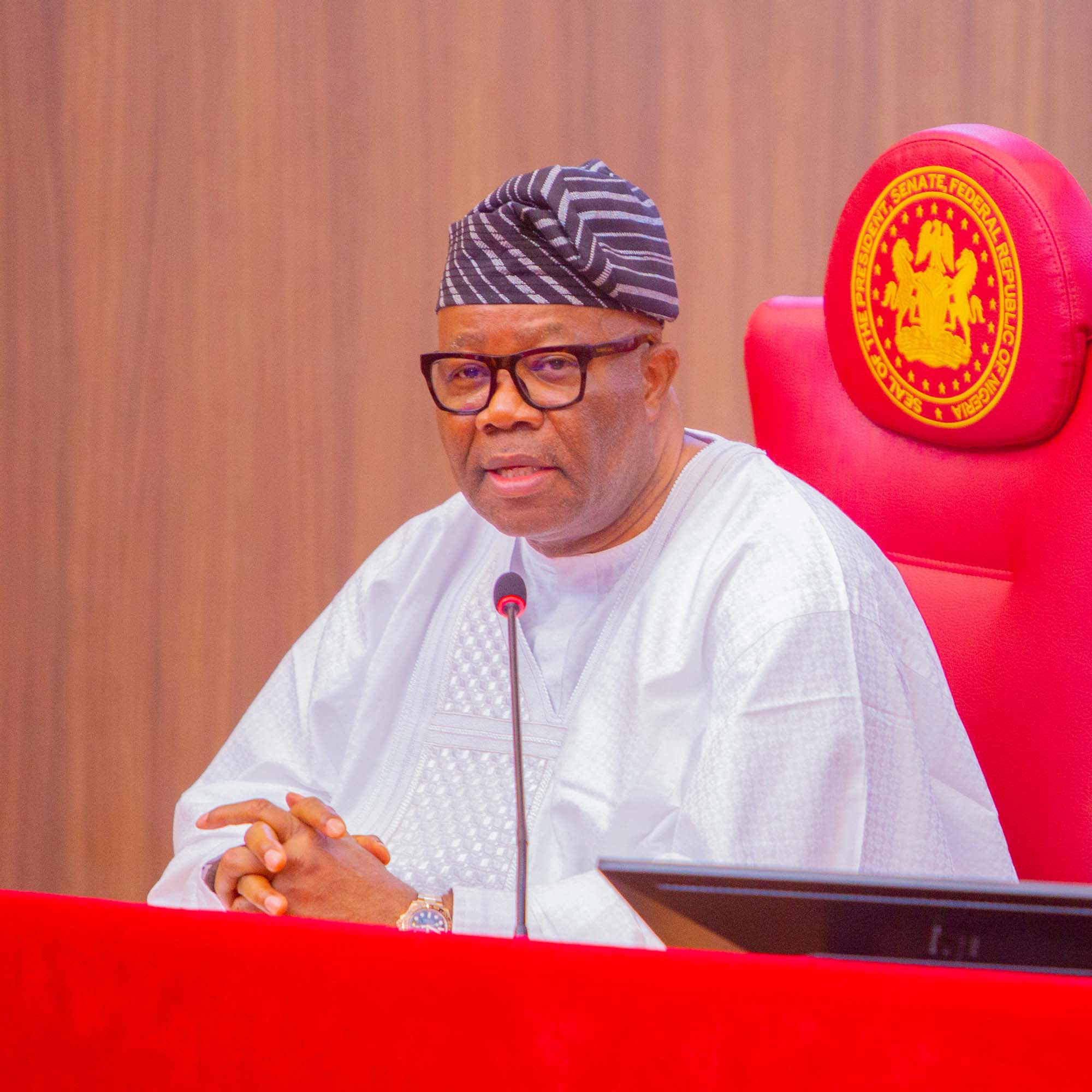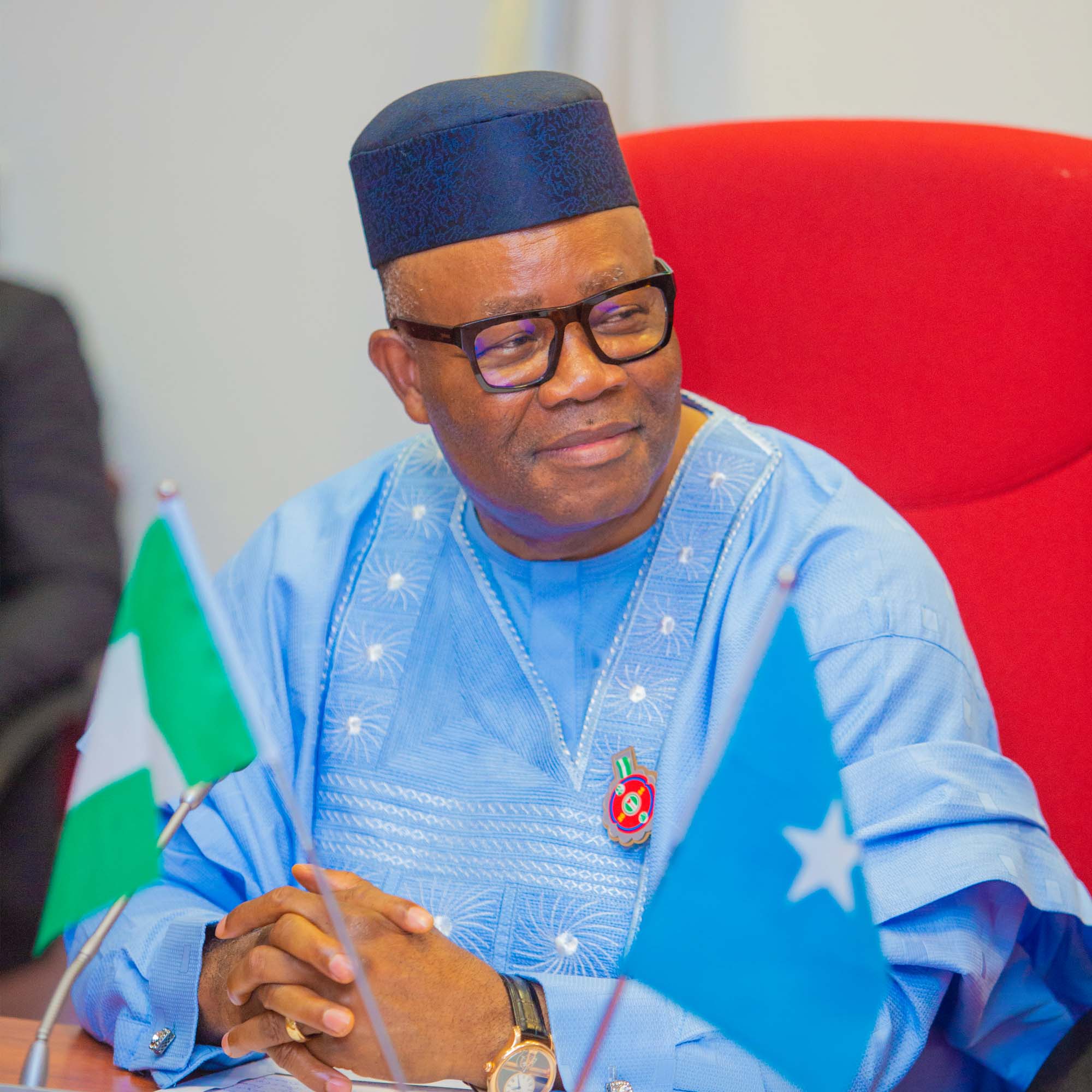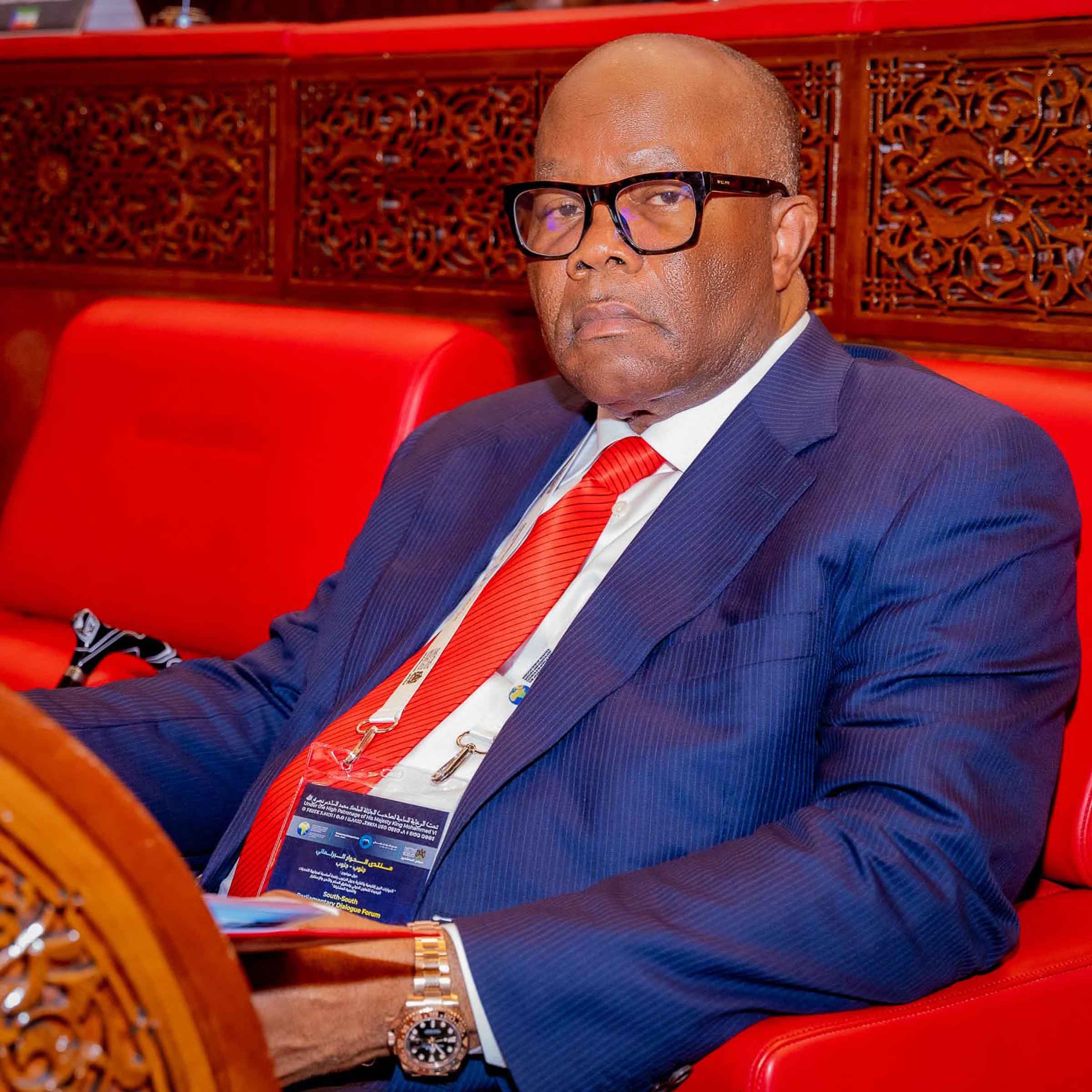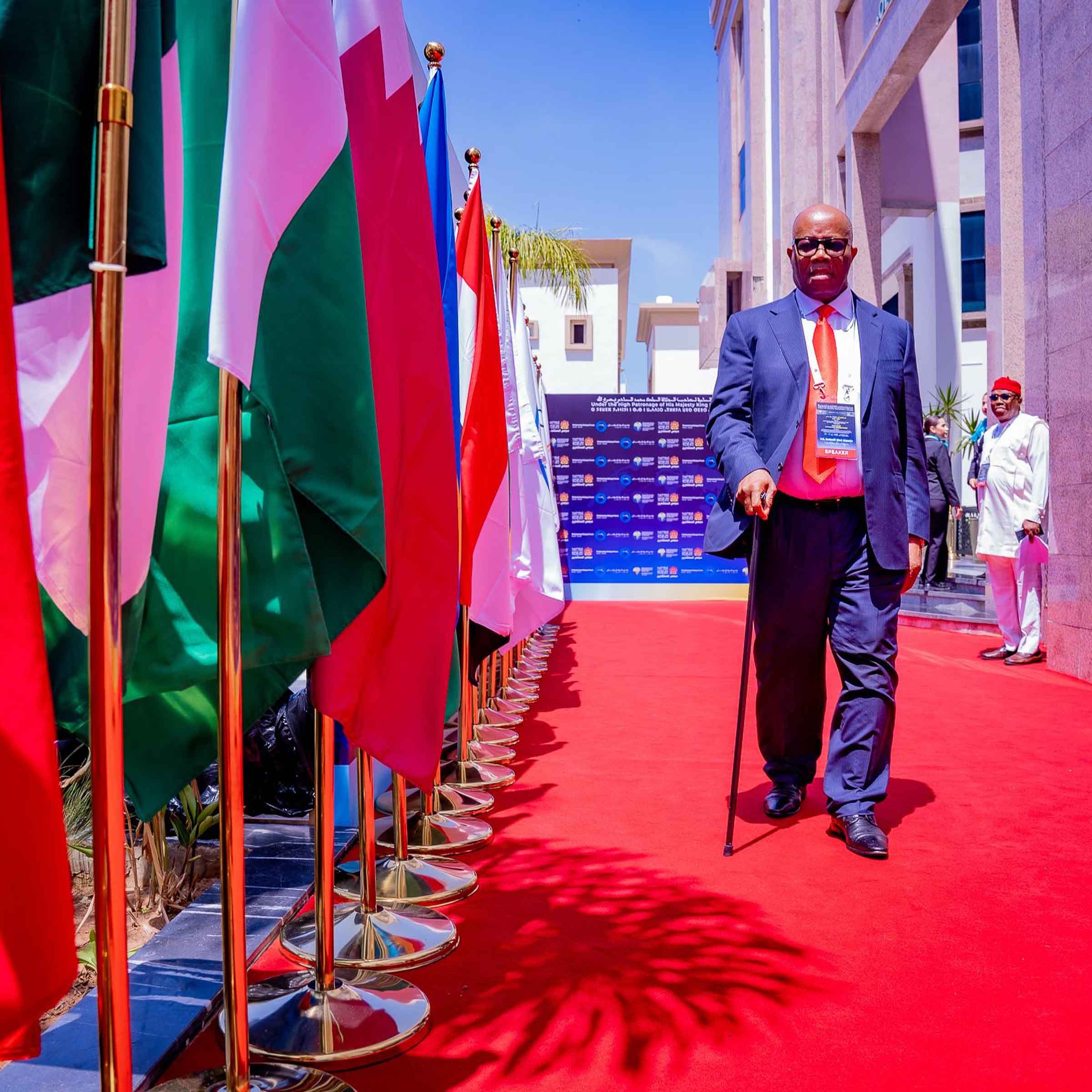A LEGACY OF SERVICE
Godswill Obot Akpabio by dint of hardwork, committed service to the people at any station in life that he has found himself, and the grace of the Almighty God, has risen to become a prominent figure in Nigerian politics as the President of the 10th Senate of the Federal Republic of Nigeria and the Chairman of Nigeria’s National Assembly and by implication the head of the Legislative Arm of Government.
BIRTH AND EARLY LIFE
He was born on December 9,1962, into a highly respected family (The Great Akpabio family) in Ukana Ikot Ntuen in the present Essien Udim Local Government Area of Akwa Ibom State. His father, Chief Obot Akpabio was a World War II veteran, but died just six months after the birth of the young Master Godswill. Consequently, he was raised by his mother, Madam Lucy Obot Akpabio (nee Inyangetor) who instilled in him strong values of hard work, discipline, and integrity.
From early childhood, providence honed the leadership acumen of Akpabio, with an innate passion for helping people expand their imagination and maximize their potentials. This passion did not only deepen in him a strong sense of service and a great passion for excellence, it led him to positions of leadership in the different stages of his life. Like a diligent coach, destiny prepared him painstakingly for impact and influence.
EDUCATION
He began his educational journey at Methodist Primary School, Ukana where he did his elementary education before he moved on to the prestigious Federal Government College, Port Harcourt, Rivers State for his secondary education. Being raised by a single mother and not having been born with a silver spoon in his mouth, at a time tuition fees were being paid in public schools, the young Godswill struggled financially through school and never allowed his indigence to blur his vision of greatness. Rather he had his sight on academic excellence. As he often quips: the difference between the car driver and the owner of the car is education and industry.
His leadership potential was first acknowledged at the Federal Government College, Port Harcourt, where he was made the General Senior Prefect at the school which draws Nigerians from all parts of the country. It was at this Secondary School that he developed a pan-Nigerian world view and relating with his fellow students from the North, South, East and West not on the basis of their tribe or religion but on the basis of who they were as Nigerians. Like most young persons there are stories of his adventures in school but he remained very focussed on his academic attainment, if for nothing else to reward the efforts and sacrifice of his struggling mother.
Upon the completion of his secondary education in Port Harcourt, the young Akpabio gained admission to study Law at the University of Calabar. His passion for public advocacy and his remarkable oratory skills were evident during his years as a student at the University of Calabar. It was no surprise that he was overwhelmingly elected as the Speaker of the Students’ Union Parliament of the Malabor Republic, (as Unical is fondly called) a role that further prepared him for service on a larger scale in the society.
After Graduating with a bachelor’s degree (LLB) in Law from the University of Calabar, Akpabio enrolled in the Nigerian Law School, Lagos and was called to the Nigerian Bar as a Barrister at Law (LB) an Advocate and Solicitor of the Supreme Court in 1988. He gained experience in private Law practice at Paul Usoro & Co, a reputable Law firm in Lagos.
PRIVATE SECTOR PLAYER
In the course of his illustrious career in the private sector, Akpabio held various positions of influence and responsibility. He served as the Director of Corporate Affairs and Legal Services at EMIS Telecoms Limited, a wireless telecommunications company in Lagos. He later rose to the position of the Managing Director/Chief Executive Officer of the pioneer fixed wireless telecommunications company. In this position, he helped in shaping the future of the burgeoning telecommunication industry. EMIS was the forerunner of today’s telecommunication companies like Glo, MTN, Airtel, 9mobile and others.
Additionally he played a vital role as the National Publicity Secretary of the Association of Telecommunication Companies in Nigeria.
ADVENTURE INTO PUBLIC SERVICE
In 2002, Chief Godswill Akpabio was appointed the Honourable Commissioner for Petroleum and Natural Resources in the Government of Akwa Ibom State by the administration of Obong Victor Attah. His competence, efficiency and dedication to public service led to his further appointments to several other cabinet positions in Akwa Ibom state as Commissioner for Local Government and Chieftaincy Affairs, and Commissioner for Lands and Housing which he discharged his duties creditably.
These vantage positions enabled him to feel the pulse of the people and the State, and strengthened his aspiration and resolve to govern the state. His admirable attributes, charisma and an unbroken bond with the grassroots led to a statewide agitation especially among the youths for him to seek a higher office of the Governor of the oil-rich Akwa Ibom State. Subsequently, he voluntarily resigned his position in the State Executive Council to pursue his aspiration, even with the odds stacked against him, having lost the support of the incumbent Governor, whose succession preference was for his son-in-law. However with his strong belief that he had the support of the people, he remained undaunted.
His governorship campaign which had a mass appeal was anchored on the unselfish premise: “Let God’s will be done!” With the mass support he garnered, and the will of God, he defeated a record 57 aspirants in the hotly contested governorship primaries of the Peoples Democratic Party (PDP) which lasted for three days in 2006 to emerge the governorship candidate of the party. Some of his co-contestants were already political juggernauts, men of timbre and caliber who had held various political positions in the State and nationally.
On April 24, 2007, Chief Akpabio was massively elected as the Governor of Akwa Ibom State and took the oath of office on May 29, 2007 as the third elected Governor of Akwa Ibom State. His stellar performance in the first term secured his overwhelming re-election for a second term in 2011 despite opposition which was based on primordial sentiments.
As the Governor of Akwa Ibom State indeed God’s will was done in all facets of life in the State through massive infrastructural development, education, health care, rural development and human capacity building. His administration’s achievements earned him overwhelming support from the people, who gave him the sobriquet, “Uncommon Transformer.”
One of the very significant achievement of his administration as the Governor of Akwa Ibom State was his declaration that no Akwa Ibom child should suffer what he went through with the struggle of his mother to pay his school fees through his declaration of non discriminatory free and compulsory education for all Nigerian children living in Akwa Ibom from primary to senior secondary school level. This singular policy went a long way to curb the house-help syndrome which the State was hitherto known for and the out-of-school syndrome among children was completely eradicated.
The free and compulsory education policy of his administration was codified into law and it became a punishable offence for any child of school age to be seen hawking during school hours or even roaming on the streets. Education Minitors were deployed across the State to enforce this law. By this singular act, school enrollment in the state quadrupled. His administration built over 4000 classroom blocks and rehabilitated about 2000 schools across the State to support the programme.
In his resolve as Governor to make the welfare of the people the centre-piece of his administration, in the area of healthcare he declared free healthcare for children under five years, the elderly and pregnant women. He also built five brand new general hospitals and multi-specialty hospital of international standard.
The former Minister of Health, Prof Isaac Adewole was so amazed at Ibom Specialist Hospital built by Akpabio when he embarked on a tour of the hospital that he declared that Nigerians had no reason to embark on medical tourism abroad with the facilities he saw at the hospital which he described as world-class.
The stadium he built, fittingly named after him as Godswill Akpabio International Stadium, is the only FIFA approved stadium in Nigeria, and has played hosts to several international matches involving the men’s national football team, the Super Eagles, which the Nigerian Football Federation has adopted for their home matches.
Indeed he opened up the State for tourists with the completion of the Ibom International Airport which he met at site clearing level and had since completed it with a 3.6 km runway. The airport also comes with the maintenance, repair and overhaul facilities. Named after his predecessor, Obong Victor Attah, it has become a reference point of state’s investment in aviation development.
Also in the area of tourism, he built and commissioned the Four Points by Sheraton Hotel in Ikot Ekpene, completed the Ibom Hotel and Golf Resort, Uyo and a brand new Ibom Tropicana, a world class business and entertainment resort with a five-star hotel and an international conference centre.
The development of road infrastructure during Chief Akpabio’s tenure as Governor was unprecedented. He constructed five new fly-over, built over 350 new roads totalling over 1500 kilometers. He never discriminated against federal roads as he dualized them using world reknown construction companies while not neglecting local contractors for other road projects.
The perenial flooding of Uyo and its environs had been a dent on the image of the capital city as houses in some parts of the city were always submerged by flood during the rainy season. To put an end to this he engaged an international construction company to deploy the underground pipe-jacking technology to tackle the issue of flooding. It was the first time the technology was deployed in Africa.
The seat of the government witnessed a complete turn around in infrastructure with the building of the state-of-the-art governor’s lodge, governor’s office and executive council chambers, banquet hall, presidential guest houses with provisions of sporting facilities. Till date the Akwa Ibom State Government House ranks as one of the best in the country.
Indeed his was the era of various youth empowerment schemes from the interministerial direct labour jobs farmed out to youths across the state for construction of classroom blocks and water projects to agricultural initiatives such as the Women Agro Enterpreneurship Develooment Programme (WAEDEP) and the Integrated Farmers’ Scheme, youths and women were effectively engaged. Till date Chief Akpabio is still known as the one who turned boys to men and girls to women.
Industrialization was also a priority of his administration. In this regard he completed the Ibom Power Plant project which was started by the previous administration with a 191 megawatts electricity generation capacity. This was followed with the Public-Private partnership setting up of the Ibom gas plant with 69 km pipeline to supply gas to the Ibom Power Plant. These initiatives gave rise to several other small and medium enterprises to promote businesses and enterpreneurship.
It is noteworthy that Chief Akpabio assumed office as Governor of Akwa Ibom State at a time the Niger Delta witnessed security challenges including kidnapping for ransom. However, he rose to the occasion by launching two security outfits code named “Operation Thunder” and “Quick Response Squad.” He also equipped the various security agencies in the State to boost their operations by provision of vehicles and modern security gadgets and equipment which led to improved security in the State.
Till date, civil servants in Akwa Ibom State still celebrate Chief Akpabio as the Governor who made their welfare a top priority of his administration. He was the first Governor in Nigeria to accept to pay the workers the new minimum wage at the time and he paid above the negotiated rate. He also added the innovation of paying the State workers a 13th month salary for the Christmas and New Year celebrations which the workers nicknamed “Akpabiomber.”
It will be diffucult, if not impossible to chronicle the transformational development initiative of the one Akwa Ibom people till date fondly call the Uncommon Transformer in a book of this nature. However suffice it to say that the period between 2007 and 2015 will always be remembered as the golden era of development in Akwa Ibom State.







